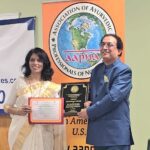India
healthysoch
New Delhi, June 26, 2021 :
The first WHO World Local Production Forum ended today after five days of discussions centered on promoting quality and sustainable local production to improve access to medicines and other health technologies.
- Delegates from over 100 countries, international partners, civil society groups, industry associations, and major investors joined WHO, WTO, UNIDO, UNICEF and UNCTAD to highlight the challenges facing local production and the steps required to address them, as well as the range of opportunities for the sector.
Looking ahead, the Forum will provide a platform to drive forward efforts to support and enhance local production of health products in low- and middle-income countries.
Forum conclusions, recommendations and next steps
Increasing manufacturing capacity for global security – The COVID-19 pandemic has highlighted the importance of local manufacturing as a key component of pandemic response by reducing reliance on global markets and imported products.
Vaccine production was a central theme at the Forum, as were the role of new technologies and generation of flexible manufacturing strategies to develop sustained production capacity in low- and middle-income countries.
Technology transfer and licensing were seen as key to scaling up production. Sharing intellectual property and know-how will be essential, along with facilitation of voluntary licensing and effective technology transfer. It will also be vital to create a favourable environment for technology transfer. Key elements will include good governance; a skilled workforce; good access to market information and careful assessment of local capacity to receive and absorb the transferred technology.
Governments’ role is key in creating an enabling political environment and a supportive business eco-system. Such efforts must be coordinated with relevant stakeholders at national, regional and global levels.
National regulators and local manufacturers can drive quality-compliant local production and facilitate faster access to health technologies during pandemics and beyond. To do that, they need continued training, support and resources.
Low access to capital is a key limiting factor for local manufacturers in low- and middle-income countries. The greater interest expressed by key development banks and other financial institutions towards investing in the sector indicates improvement in this area, whilst the need to develop strong investment cases, including demonstration of a long term economically viable business case, were highlighted as key components of successful manufacturing projects.
A mechanism to stimulate industry engagement was recommended for strengthened collaboration with and among industry bodies with the aim of transferring priority technologies to low- and middle-income countries.
A strategic advisory group should be established by WHO in collaboration with Member States and partners to address current and future global challenges and trends in local production and technology transfer.
The next Forum will be held in The Netherlands as announced by Deputy Prime Minister and Minister of Health, Welfare and Sport, Hugo De Jonge. The Local Production Forum is now established as a long-term mechanism to promote dialogue and decision-making to strengthen local manufacturing capacity and move towards the shared goal of universal access to health technologies.
healthysoch







